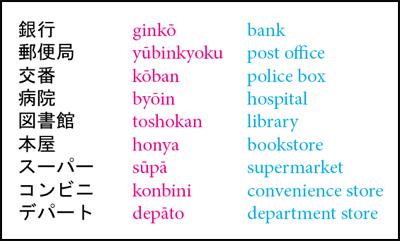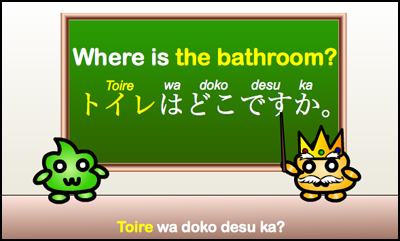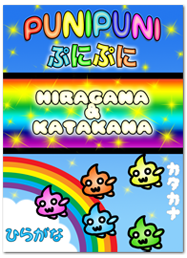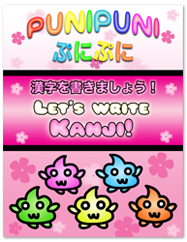Japanese Grammar Lesson 5: Where is…? …はどこですか? – Review Notes
Today we learned how to ask where something is in Japanese using the pattern “… wa doko desu ka?“ Using this pattern, we learned how to ask “where is the bathroom?” and “where is the station?” in Japanese. In this review we will go over these questions and see some more examples.
………………………………………………………………………………..
Using the structure “…wa doko desu ka?” – “Where is…”

★ This structure is used to ask where something is.
★ The word どこ (doko) means where. Just like English,どこ can be used by itself as a question meaning“where?” or in a longer sentence to ask where something is. To simply ask “Where?” more politely, you can just ask “doko desu ka?”
………………………………………………………………………………..
★ トイレ (Toire) means bathroom in Japanese.
★ In Japan, the toilet and the bath are not actually in the same room. The word トイレ is referring to the room that the toilet is in, not the room that the bath is in.
★ Another way to say bathroom is お手洗い (otearai). This word is a little more formal and is similar to the English word “washroom.” The kanji 手 means “hands” and 洗う means “to wash.”
………………………………………………………………………………..

★ えき (eki) means station. Japanese people use trains a lot, so this phrase will be helpful when you are traveling in Japan!
★ The kanji for えきis 駅
………………………………………………………………………………..
More Examples:
Using this pattern, you can ask a lot of things! Below are a few more examples and a list of words that you could substitute into the pattern to ask where different things are!
………………………………………………………………………………..
Example 1:
お父さんはどこですか?
otōsan wa doko desu ka?
Where is dad?
………………………………………………………………………………..
Example 2:
かぎはどこですか?
Kagi wa doko desu ka?
Where is the key?
………………………………………………………………………………..
Example 3:
公園はどこですか?
kōen wa doko desu ka?
Where is the park?
………………………………………………………………………………..
Extra Vocabulary:

………………………………………………………………………………..
Conclusion:
Today we learned how to ask where something is in Japanese using the sentence pattern …wa doko desu ka? There are many more possibilities besides the ones we mentioned here. If you want to try making a question using this pattern, leave a comment below!
………………………………………………………………………………..
Get Japanese dictionary!
Do you want to know a lot of Japanese words? I recommend you to get a dictionary!
If you have dictionary, you can always look up new Japanese words\(◕ω◕)/♥
………………………………………………………………………………..
Do you want a Japanese tutor?
Take Japanese Skype Lessons with Professional Japanese Teachers on kakehashijapan.com!
………………………………………………………………………………..
………………………………………………………………………………..

















6 comments
Is it correct to say “kare wa doko itta” for “where did he go”
Comment by glenn on 01/01/2013 at 3:06 amIf you want to speak casually, you can say this (◕ω<)♥ If you want to speak more formally, you should say 彼はどこへ行きましたか(kare wa doko e ikimashita ka?)
Comment by PuniPuni on 01/01/2013 at 10:12 amIs it correct to say “doko itte imasu ka” for “where are you going”
Comment by glenn on 01/01/2013 at 3:21 amUsually -te imasu is the same as -ing in English, but in this case we don’t use that form. In this case, we would say どこに行くのですか (doko ni iku no desu ka?) or どこにいきますか (doko ni ikimasu ka?) (◕ω<)♥
Comment by PuniPuni on 01/01/2013 at 10:09 amCould you use “arimasu” or “imasu” to ask where something is? As in “Ototosan wa doko ni arimasu ka” for “Where is brother?”
Comment by Kiba on 02/28/2014 at 3:19 pmYes, but you have to use “imasu” for living things like people. “Arimasu” can only be used for inanimate objects. So, you could say 弟さんはどこにいますか? (Otōto-san wa doko ni imasu ka?) – “Where is (your) little brother?” Check out our lesson on “imasu” and “arimasu” (◕ω< )b☆ http://www.punipunijapan.com/arimasu-imasu/
Comment by PuniPuni on 03/01/2014 at 12:10 am